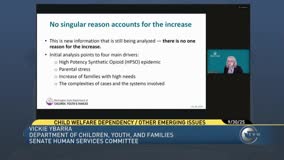DCYF Officials Discuss Child Welfare Challenges and New Initiatives in Washington State
September 30, 2025 | Legislative Sessions, Washington
This article was created by AI summarizing key points discussed. AI makes mistakes, so for full details and context, please refer to the video of the full meeting. Please report any errors so we can fix them. Report an error »

In a recent meeting of the Senate Human Services Committee, significant discussions emerged regarding the challenges faced by families in the child welfare system, particularly in the wake of increased economic stress following the pandemic. The meeting highlighted a troubling rise in families with high needs, many of whom are struggling without adequate placement or support. This situation has been exacerbated by recent statutory changes that have complicated the existing systems designed to assist these families.
The committee addressed the alarming trends observed in the first quarter of the year, prompting immediate action from child welfare officials. Among the initiatives discussed was the statewide implementation of "safe child consult," a case staffing process aimed at ensuring the safety of children under three years old in situations involving opioid use. This program allows caseworkers to seek guidance from more experienced colleagues, enhancing the support available to vulnerable families.
Additionally, the committee emphasized the importance of gathering insights from frontline staff to improve practices and responses to the ongoing crisis. Child welfare leadership has been conducting sessions to collect feedback on the impact of synthetic opioids, with plans for public briefings to share findings and best practices.
Geographic disparities in the prevalence of these issues were also a focal point, particularly in areas like Spokane, where a significant increase in cases has been noted. The committee discussed the need for better resource allocation to address these hotspots effectively, ensuring that support reaches families where it is most needed.
As the meeting progressed, members raised questions about the age breakdown of affected children and requested a hotspot map to visualize the distribution of cases. These inquiries reflect a growing concern among lawmakers about how to strategically deploy resources to maximize their impact on families in crisis.
The discussion concluded with a call for enhanced training for caseworkers, particularly in dealing with medically complex cases and medical neglect. The committee acknowledged that many families require more comprehensive support services, which are outlined in a decision package submitted for consideration.
Overall, the meeting underscored the urgent need for systemic improvements in the child welfare system, emphasizing prevention and early intervention to support families before they reach a crisis point. As the committee prepares to address these challenges, the focus remains on ensuring that families receive the necessary resources and support to thrive.
The committee addressed the alarming trends observed in the first quarter of the year, prompting immediate action from child welfare officials. Among the initiatives discussed was the statewide implementation of "safe child consult," a case staffing process aimed at ensuring the safety of children under three years old in situations involving opioid use. This program allows caseworkers to seek guidance from more experienced colleagues, enhancing the support available to vulnerable families.
Additionally, the committee emphasized the importance of gathering insights from frontline staff to improve practices and responses to the ongoing crisis. Child welfare leadership has been conducting sessions to collect feedback on the impact of synthetic opioids, with plans for public briefings to share findings and best practices.
Geographic disparities in the prevalence of these issues were also a focal point, particularly in areas like Spokane, where a significant increase in cases has been noted. The committee discussed the need for better resource allocation to address these hotspots effectively, ensuring that support reaches families where it is most needed.
As the meeting progressed, members raised questions about the age breakdown of affected children and requested a hotspot map to visualize the distribution of cases. These inquiries reflect a growing concern among lawmakers about how to strategically deploy resources to maximize their impact on families in crisis.
The discussion concluded with a call for enhanced training for caseworkers, particularly in dealing with medically complex cases and medical neglect. The committee acknowledged that many families require more comprehensive support services, which are outlined in a decision package submitted for consideration.
Overall, the meeting underscored the urgent need for systemic improvements in the child welfare system, emphasizing prevention and early intervention to support families before they reach a crisis point. As the committee prepares to address these challenges, the focus remains on ensuring that families receive the necessary resources and support to thrive.
View full meeting
This article is based on a recent meeting—watch the full video and explore the complete transcript for deeper insights into the discussion.
View full meeting
